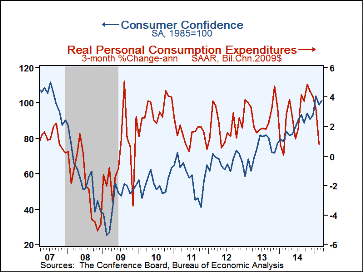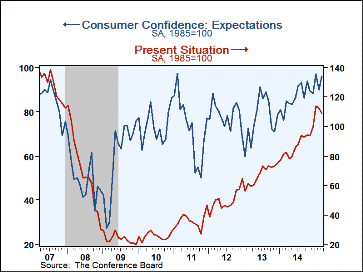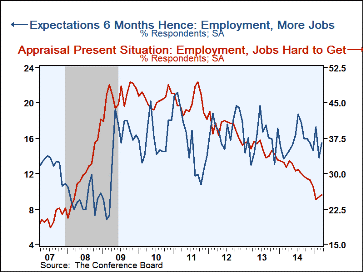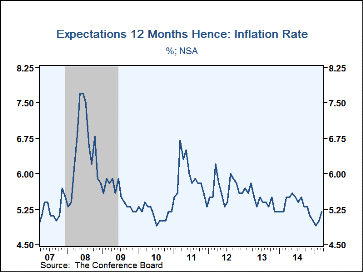 Global| Mar 31 2015
Global| Mar 31 2015U.S. Consumer Confidence Recovers
by:Tom Moeller
|in:Economy in Brief
Summary
The Conference Board's Consumer Confidence Index improved to 101.3 in March (20.7% y/y) and made up half of last month's decline to 98.8, revised from 96.4. The latest figure was stronger than expectations for 96.5 in the Action [...]
The Conference Board's Consumer Confidence Index improved to 101.3 in March (20.7% y/y) and made up half of last month's decline to 98.8, revised from 96.4. The latest figure was stronger than expectations for 96.5 in the Action Economics Forecast Survey. During the last ten years, there has been a 45% correlation between the level of confidence and the three-month change in real personal consumption expenditures.
The expectations figure recouped virtually all of its February decline with a 6.7% rise (13.2% y/y) to 109.1. The present situation reading declined 2.7% (+32.2% y/y) to 109.1 and added to its earlier shortfall.
Business conditions were rated as "good" by a stable 26.7% of respondents. Jobs were viewed as hard to get by a slightly higher 25.4% of respondents, but that remained down from a 49.4% high in September 2011. Business conditions improvement in six months was expected by a 16.7%, down from 20.8% in August. An improved 18.4% expected income to increase, up from 15.3% twelve months ago. The inflation rate expected in twelve months moved up to 5.2%, its highest level since October.
By age group, confidence among those under 35 rebounded by one-quarter versus last year to its highest level since 2006. Confidence amongst individuals over age 55 firmed to its strongest level since 2007. Confidence amongst those aged 35-54 years slipped versus February but remained 15.2% higher versus 12 months ago.
A greatly lessened 0.6% of respondents planned to buy a new home within six months, equaling the fewest since June. A slightly lower 48.4% planned to buy a major appliance within six months. A lessened 4.0% planned to buy a new automobile.
The Consumer Confidence data is available in Haver's CBDB database. The total indexes appear in USECON and the market expectations are in AS1REPNA.
Majority of Hires Never Report Looking for a Job from the Federal Reserve Bank of San Francisco can be found here.
| Conference Board (SA, 1985=100) | Mar | Feb | Jan | Y/Y % | 2014 | 2013 | 2012 |
|---|---|---|---|---|---|---|---|
| Consumer Confidence Index | 101.3 | 98.8 | 103.8 | 20.7 | 86.9 | 73.2 | 67.1 |
| Present Situation | 109.1 | 112.1 | 113.9 | 32.2 | 87.3 | 67.6 | 49.8 |
| Expectations | 96.0 | 90.0 | 97.0 | 13.2 | 86.6 | 77.0 | 78.6 |
| Consumer Confidence By Age Group | |||||||
| Under 35 Years | 128.2 | 114.2 | 126.0 | 25.2 | 106.6 | 93.1 | 86.5 |
| Aged 35-54 Years | 103.0 | 107.0 | 103.6 | 15.2 | 92.4 | 76.8 | 68.5 |
| Over 55 Years | 91.2 | 85.9 | 91.1 | 26.0 | 73.7 | 61.2 | 56.7 |
Tom Moeller
AuthorMore in Author Profile »Prior to joining Haver Analytics in 2000, Mr. Moeller worked as the Economist at Chancellor Capital Management from 1985 to 1999. There, he developed comprehensive economic forecasts and interpreted economic data for equity and fixed income portfolio managers. Also at Chancellor, Mr. Moeller worked as an equity analyst and was responsible for researching and rating companies in the economically sensitive automobile and housing industries for investment in Chancellor’s equity portfolio. Prior to joining Chancellor, Mr. Moeller was an Economist at Citibank from 1979 to 1984. He also analyzed pricing behavior in the metals industry for the Council on Wage and Price Stability in Washington, D.C. In 1999, Mr. Moeller received the award for most accurate forecast from the Forecasters' Club of New York. From 1990 to 1992 he was President of the New York Association for Business Economists. Mr. Moeller earned an M.B.A. in Finance from Fordham University, where he graduated in 1987. He holds a Bachelor of Arts in Economics from George Washington University.
More Economy in Brief
 Global| Feb 05 2026
Global| Feb 05 2026Charts of the Week: Balanced Policy, Resilient Data and AI Narratives
by:Andrew Cates










